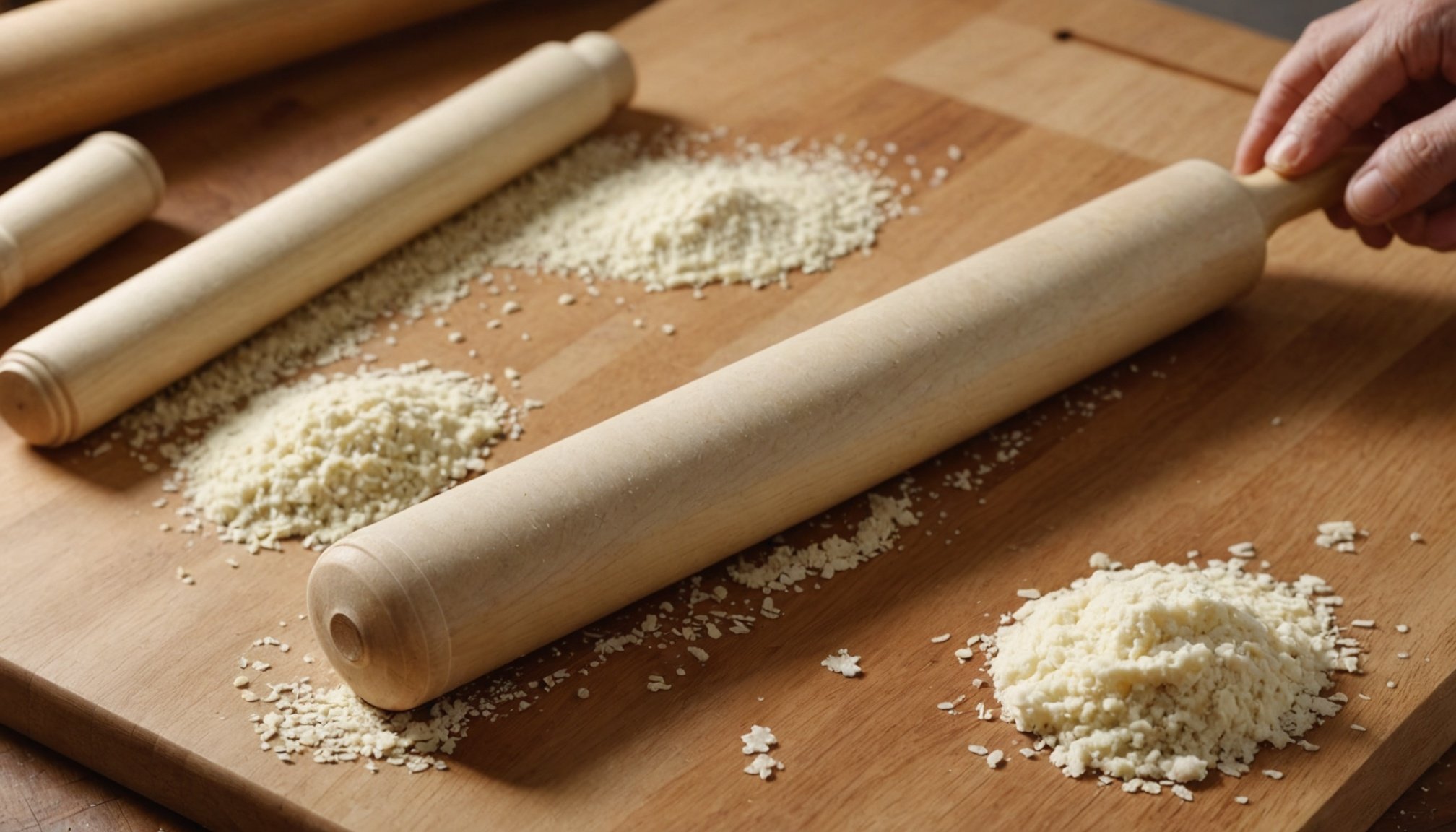From the flaky layers of a buttery croissant to the perfect circular crust of an apple pie, the rolling pin plays a pivotal role in the baking process. Yet, in the heat of the kitchen, few things are more frustrating than dough sticking stubbornly to your trusty pin. This article aims to guide you through the process of selecting a rolling pin material that sticks less, turning a potential baking nightmare into a dream.
Understanding the Importance of Material in a Rolling Pin
Rolling pins may seem like simple tools, but the material of the pin can significantly impact your baking results. While many factors can influence dough sticking to a pin, such as the dough’s temperature or how much flour you use, the material of the rolling pin is a critical factor that is often overlooked.
Additional reading : What Material Is Most Resistant to Scratches in Kitchen Sinks?
When it comes to rolling pins, there’s a wide range of materials to choose from, including wood, marble, stainless steel, and silicone. Each has its unique properties that can influence how the dough behaves during the rolling process. By understanding these attributes, you can make an informed decision on the best rolling pin for your needs.
The Classic Charm of Wooden Rolling Pins
Wooden rolling pins are a staple in many kitchens, appreciated for their traditional feel and efficient performance. Different types of wood, such as maple, cherry, and walnut, offer slight variations in hardness and texture, affecting the dough’s ‘stickability’.
This might interest you : Which Dishwasher Features Are Best for Sanitizing Baby Bottles?
Among wooden options, Adams is a renowned brand known for its high-quality pin designs. A popular choice is their maple rolling pin. This pin is inherently non-stick due to the fine grain of maple wood. It’s also easy to clean, as the smooth surface repels dough and flour particles.
Tapered French pins, often made of beech wood, are another wooden variant worth mentioning. These dowel-shaped pins, devoid of handles, offer exceptional control when rolling out dough, reducing the likelihood of sticking.
The Cool Sophistication of Marble Rolling Pins
For those who frequently work with pastry or pie dough, a marble rolling pin could be your best partner in the kitchen. Known for their heft and cool temperature, marble pins can help prevent the butter in your dough from melting too quickly, a common cause of sticking.
Marble pins also have a sleek, non-porous surface that resists sticking, making them ideal for working with sticky doughs. These pins can be found in various online marketplaces, with Amazon offering an extensive range to suit different budgets and preferences.
Remember, however, that marble pins are heavier than their wooden counterparts. This can make them more challenging to maneuver, particularly for those new to baking.
Exploring Other Rolling Pin Materials
Beyond wood and marble, other materials also offer potential benefits in reducing dough stickiness.
Stainless steel rolling pins, for example, share the cooling properties of marble pins but are much lighter, making them easier to handle. Like marble, they also have a non-porous surface that resists sticking.
Silicone rolling pins, on the other hand, offer a naturally non-stick surface that resists dough and is easy to clean. These pins are also lightweight and ergonomic, making them a comfortable option for prolonged baking sessions.
While these materials may not have the traditional appeal of wood or the cool elegance of marble, they can be practical alternatives for those seeking a low-stick rolling experience.
Factors to Consider When Choosing a Rolling Pin Material
While the material of a rolling pin is crucial, other factors can also influence your decision.
The weight of the pin, for instance, can affect your control over the dough. Heavier pins, like those made of marble, can effortlessly flatten dough, but may be more strenuous to use. Lighter pins, such as those made of silicone or stainless steel, may require more effort to roll out dough but offer greater maneuverability.
The type of dough you frequently work with should also inform your choice. For instance, if you regularly make pies or pastries, a pin that stays cool, like marble or stainless steel, could be advantageous. If you’re a fan of bread or pizza, a wooden pin may offer the best balance of weight and control.
Finally, consider your personal preferences and comfort. Some may prefer the feel of a hefty marble pin in their hands, while others might find a lightweight silicone or stainless steel pin more pleasant to use.
In conclusion, choosing a rolling pin material that sticks less involves understanding the properties of various materials, taking into account the type of dough you’re working with, and considering your comfort and preferences. By taking these factors into account, you’ll be well-equipped to select a rolling pin that will make your baking experience more enjoyable.
Unearthing the Sleek Edge of Stainless Steel Rolling Pins
Stainless steel rolling pins, although not as traditional as wood, offer a modern edge within the array of rolling pin options. Much like marble, stainless steel rolling pins have the advantage of retaining coolness. This feature is especially beneficial when working with pie dough or pastry dough, where maintaining a low temperature can prevent the butter from melting and leading to sticky situations.
The sleek surface of stainless steel rolling pins is non-porous, meaning they are naturally resistant to the stickiness of dough. If you’re working with particularly sticky dough, such as a high-hydration bread dough or certain cookie doughs, a stainless steel pin can be a practical choice.
The RSVP International is a popular stainless steel pin available on Amazon. It has a smooth, chilled surface that effortlessly rolls out dough, with the added benefit of being dishwasher safe. A quick glance at its Amazon reviews highlights the praise for its easy-to-clean nature and non-stick properties.
When it comes to weight, stainless steel rolling pins fall somewhere between marble and wood. They’re not as heavy as marble, offering more ease of maneuverability, but they do provide a substantial feel that some bakers may prefer over lighter materials like silicone.
Embracing the Flexibility of Silicone Rolling Pins
Silicone rolling pins are a relatively new addition to the baking scene, but they’ve quickly gained popularity for their unique advantages. One major selling point is their inherent non-stick surface, which resists dough and makes cleaning a breeze. Simply rinsing under warm water or popping into the dishwasher can easily remove any residual dough or flour.
The Whetstone Woodenware silicone pin is a top-rated option on Amazon, celebrated for its non-stick surface and easy grip. Its lightweight nature is another commendable feature, which reduces hand fatigue during extensive baking endeavors.
Although lighter than wooden, marble, or stainless steel pins, silicone rolling pins still manage to roll dough effectively. They might require a bit more pressure, but the easy maneuverability compensates for this. Plus, they come in a variety of bright colors, adding a fun element to your baking routine.
Silicone rolling pins don’t have the cooling properties of marble or stainless steel, so they might not be the best choice for pie crust or other doughs that need to stay cool. However, they perform exceptionally well with other dough types, making them a versatile addition to any kitchen.
Conclusion: Making the Best Decision on Rolling Pin Material
Choosing the ideal rolling pin involves much more than picking a random tool from the kitchen drawer. The material of a rolling pin significantly impacts the level of dough stickiness, making it a critical factor to consider.
There’s no one-size-fits-all pin, so it’s essential to consider the type of dough you regularly work with, the weight and texture you prefer in a pin, and your comfort level with different materials. Whether it’s the traditional charm of a wooden rolling pin, the cooling sophistication of a marble one, the sleek modernity of stainless steel, or the flexible versatility of silicone, each material has its unique advantages.
When you’re ready to make your choice, don’t forget to check out the options available on Amazon. With a myriad of pins available, you’re sure to find a rolling pin that suits your needs and makes your baking experience as smooth as possible.
So, are you ready to roll your dough without the sticky mess? Consider your options, pick your ideal material, and let the good times roll in your kitchen!











